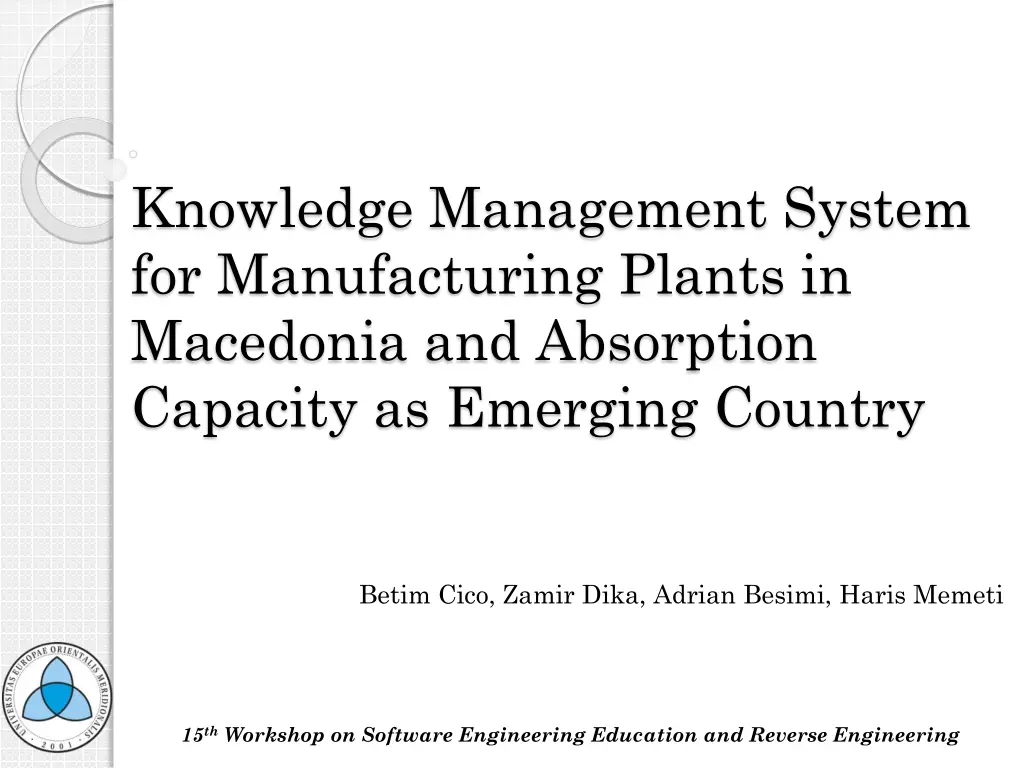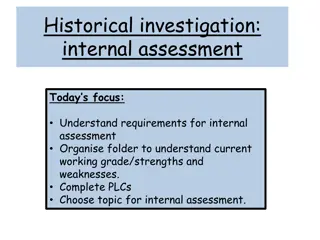
Knowledge Management System & Absorption Capacity in Macedonian Manufacturing
Learn about the importance of Knowledge Management Systems (KMS) and Absorptive Capacity in the context of manufacturing plants in Macedonia, an emerging country. Discover how KMS enhances organizational knowledge sharing, decision-making, and innovation, while Absorptive Capacity aids in adapting to new information for improved performance and learning. Explore the strategic advantages of implementing KMS in Macedonia and how it can benefit companies in this region.
Download Presentation

Please find below an Image/Link to download the presentation.
The content on the website is provided AS IS for your information and personal use only. It may not be sold, licensed, or shared on other websites without obtaining consent from the author. If you encounter any issues during the download, it is possible that the publisher has removed the file from their server.
You are allowed to download the files provided on this website for personal or commercial use, subject to the condition that they are used lawfully. All files are the property of their respective owners.
The content on the website is provided AS IS for your information and personal use only. It may not be sold, licensed, or shared on other websites without obtaining consent from the author.
E N D
Presentation Transcript
Knowledge Management System for Manufacturing Plants in Macedonia and Absorption Capacity as Emerging Country Betim Cico, Zamir Dika, Adrian Besimi, Haris Memeti 15th Workshop on Software Engineering Education and Reverse Engineering
OUTLINE Introduction Aims of Research Hypothesis Importance of Research Significant prior of research Research approach and methodology Potential outcomes of research and importance Conclusion 2
Introduction Knowledge Management is a concept developed for capturing, developing also effectively using organizational knowledge. Macedonia is an emerging country and has knowledge management importance. Benefits and availability of Macedonia to adopt IT systems in knowledge management process and information sharing. 3
What is KM System ? System to retrieve, collect and share information. Uses knowledge for any purpose of an organization. Enhances the cycle of KM by creating data, storing and mining repositories. Used for better collaboration. 4
KM is all about making right decisions for a company. Company uses KM to create strategies and tactics in systematic management of knowledge. It helps to learn for old mistakes of a company. It helps in the ability of a company to innovate on a specific field. 6
Why Macedonia ? Cheap work force. Young population as employee. Close to European Countries. Knowledge can be transferred easily. Business process initiation is literally easy. 8
What is absorptive capacity ? Ability of a company to recognize and act in the target of new information. There are many models applied. Absorptive capacity helps in performance and organizational learning of a company. 10
Aims of Research Defining the level of absorptive capacity and knowledge transfer in emerging countries by using Information Technology. Finding ways to increase knowledge transfer in emerging countries by using Information Systems. Using IT to measure companies performance in emerging countries. 12
Research Field Capability of emerging countries like Macedonia to absorb and transfer knowledge by means of Information Technology. Impact of Information Technology in organizational structure for effectiveness. Representation of knowledge transfer between developed and emerging countries. 13
Research Field Interest of managers to apply new technologies for absorbing knowledge in emerging countries. Investments in general on Information Technology. Culture Influence in assumptions and decision making in Information Systems. 14
Hypothesis Information technology will play an important role on recognizing new knowledge in Macedonia with any knowledge management system applied for a manufacturing plant. Knowledge management system capability will increase the range of quality in manufacturing plants in Macedonia. Absorption capacity would differ from country to country in the group of emerging countries. 15
Importance of Research Information Systems usage and knowledge absorption in emerging countries. Variety in the development and bringing new era in manufacturing plants in emerging countries. Investment in ERP, Supply Chain Management and Total Quality Management. 16
Significant prior research How many companies from developed countries have manufacturing plants in Macedonia? Availability of companies in Macedonia to implement the needed technology Level of education in emerging countries. 17
Research approach and methodology Emerging countries and a relation with developing countries. Questions to managers for improvement or difference in Information Systems. Analysis of opening manufacturing plant in Macedonia, benefits etc. Level of absorbance between emerging countries. 18
Potential outcomes and importance Knowledge Management System may be useful tool for developing manufacturing process in Macedonia. Information Technology would have a big contribution to make minor changes in absorbance. Knowledge transferred and their representation is important. 19
Conclusion Information system might bring lower level of knowledge absorption if not used properly. Company can become bigger if has successful cycle of application of knowledge management system. Performance of a company in developed country and emerging country in prospect of Information Technology 20
Bibliography Nungpil Hahn and Mani R. Subramani. 2000. A framework of knowledge management systems: issues and challenges for theory and practice. In Proceedings of the twenty first international conference on Information systems (ICIS '00). Association for Information Systems, Atlanta, GA, USA, 302-312. M. Lynne Markus, Cornelis Tanis, and Paul C. van Fenema. 2000. Enterprise resource planning: multisite ERP implementations. Commun. ACM 43, 4 (April 2000), 42-46 Cao, L., & Zhu, H. (2013). Normal accidents: data quality problems in ERP-enabled manufacturing. Journal of Data and Information Quality (JDIQ), 4(3), 11. Shaul, L., & Tauber, D. (2013). Critical success factors in enterprise resource planning systems: Review of the last decade. ACM Computing Surveys (CSUR), 45(4), 55. Shaul, L., & Tauber, D. (2013). Critical success factors in enterprise resource planning systems: Review of the last decade. ACM Computing Surveys (CSUR), 45(4), 55. Gupta, A., & Seshasai, S. (2007). 24-hour knowledge factory: Using Internet technology to leverage spatial and temporal separations. ACM Transactions on Internet Technology (TOIT), 7(3), 14. 21
Thank you ! Questions 22






















